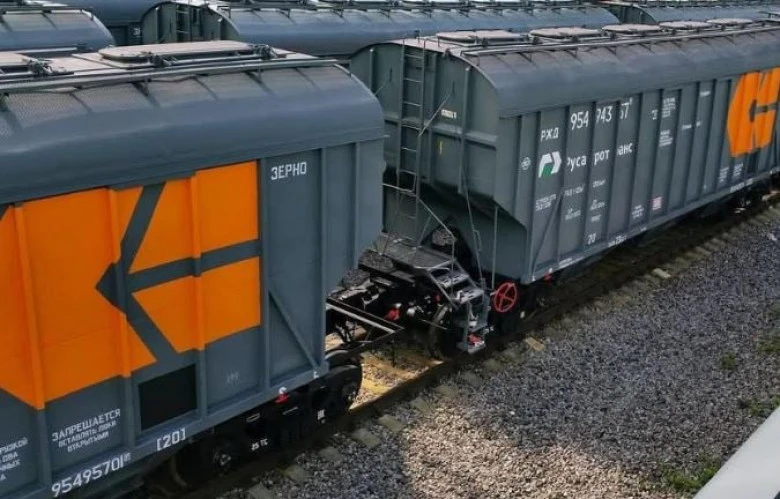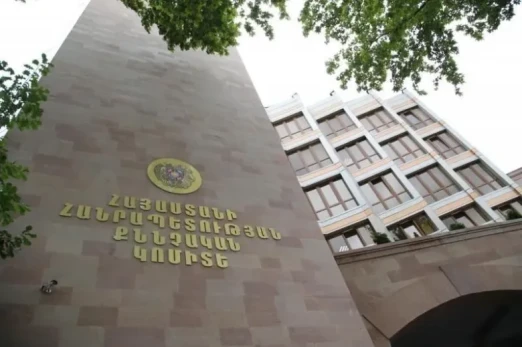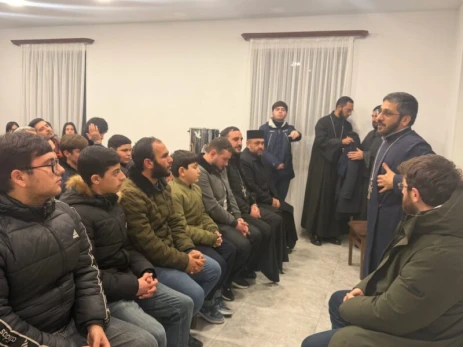"Fact" daily writes:
In October, Nikol Pashinyan announced that the long-awaited future has arrived in Armenia. The shipment of Kazakh wheat was brought through the territory of Azerbaijan. "This day has come," shouted pro-government media and propagandists. Pashinyan's team turned this seemingly insignificant news into two important conclusions. They were supposed to strengthen the pre-election narratives of the "Civil Pact", which were quite shaky until then, because it was clear that after all the concessions made for Azerbaijan, peace and security in Armenia exist only in the records of Pashinyan and his cronies.
First, this supply became the first case that could be presented as a benefit of the agreement concluded with Baku. Here, allegedly, we did not hand over lands, agreed to the extraterritorial corridor in Syunik and the "return" of 300,000 Azerbaijanis for nothing. We also allegedly have our interests. they allowed Kazakh wheat to pass through their railway.
So, as if it is not about our unilateral concessions towards Azerbaijan, but a truly mutually beneficial deal. Well, according to the authorities, Pashinyan was miraculously turning from a capitulist into a real businessman and trader. Second, the shipment of Kazakh wheat gave the "Civil Pact" the opportunity to announce the diversification of Armenia's food supplies and, therefore, the reduction of dependence on Russia. And if it is possible to announce about the reduction of dependence, then the topic can be enlarged and, for example, at least at the level of speeches, the unhindered withdrawal of Armenia from the EAEU can be considered possible.
And voila. there were really endless opportunities for pre-election campaigning. CP could have promised the Armenian people membership in the EU, NATO, and the United States of America. "Look, Putin!", the pro-government speakers cheered. However, their joy did not last long. the well-thought-out PR action completely collapsed when faced with reality.
The long-awaited (really, longer than usual) Kazakh wheat has finally arrived, but despite its rather high price, it turned out to be a low-quality raw material. In fact, that wheat was not suitable for the production of bread and beer. The RA Ministry of Economy hastened to reassure the population, announcing that the low-quality wheat was partly sent as fodder and partly used for the production of vodka ("the more vodka before the elections, the better," the authorities decided). At the same time, they admitted that by mistake "someone could have already eaten the bread baked from that al yur". This statement became a real headache for Pashinyan's PR specialists, who started waving papers, claiming that Kazakh wheat is not of the fourth, but of the third class (it seems that the third class is a good thing.
In Armenia they are used to completely different quality raw materials). Pashinyan tried to "wash his hands" of the supply, declaring that it was a private initiative, not his. However, "Hraparak" newspaper published evidence that the private supplier was pressured. As a result, another scandal broke out. Now Pashinyan's supporters are trying not to talk about the "geopolitical victory" achieved with Kazakh wheat. their only desire is to close the issue and divert attention.
At the same time, Russian wheat also came to Armenia through Azerbaijan. It was not politically very interesting for Pashinyan, but it was of high quality. However, this supply was more of a symbolic move than a real one. Since Azerbaijan and Armenia do not have a railway connection, the wheat was first sent to Georgia and only from there it was brought to Armenia. So it went the following way. Russia - Azerbaijan - Georgia - Armenia. Meanwhile, the traditional version is much simpler: Russia - Georgia - Armenia. It is not clear why to add Azerbaijan to this chain, complicating the logistics and increasing the cost. After all, everything works great even without Azerbaijan.
Actually, the main issue is not the quality of the wheat or the producer, but the fact that Armenia, by transporting vital goods through Azerbaijan, is giving Baku tools of pressure. The benevolence shown by Aliyev at this moment, when he allowed the supplies (let's say, one-time), cannot be considered sustainable.
And his expansionist rhetoric towards our country remains stable: the words about "Lake Gyocha", "Azerbaijani city of Irevan", the assertions that until the 20th century, 80 percent of the population of "West Azerbaijan" were Azerbaijanis, and that it would be good to return to that state. It should also be taken into account that during this period, Aliyev and Erdogan are trying to manage their relations with Armenia more gently, because their goal is to help Pashinyan get re-elected.
If Pashinyan is re-elected, our Turkish neighbors will no longer even try to be formally tactful, but will begin to strictly demand from Nikol everything he promised in exchange for their support. What conclusions can be drawn from this story of wheat? It showed once again that if Pashinyan and his team proudly announce their "success", then in a month wait for their failure, hysterical reactions, blaming the guilty and complete destruction.
All their "successes" exist only at the level of advertising campaigns, and in reality lead to failures. And one more thing. Armenian people should be careful about bread, as long as Pashinyan is responsible for it. The next time, something worse than fodder wheat may appear in the bread.
Details in today's issue of "Past" daily


























